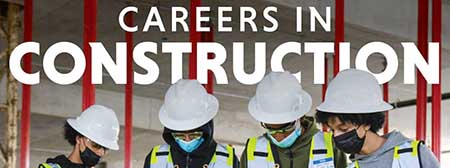|
Subscribe / Renew |
|
|
Contact Us |
|
| ► Subscribe to our Free Weekly Newsletter | |
| home | Welcome, sign in or click here to subscribe. | login |
Construction
| |
 |
August 4, 2022
Soft skills are the key advantage in the construction industry
Heather P Solutions

Polivka
|
Labor shortages. Supply chain hiccups. Global inflation.
Those are just a few challenges all industries face right now, but the construction industry is particularly hard hit. How can we overcome those barriers to meet current and future demand?
One key to success is leaders better equipped to meet today’s talent marketplace. And the tools we need to build those leaders are now more available and stronger than before. But our industry is still slow to take advantage of them.
BARRIERS TO GROWTH
Before we dive in, let’s throw out two more key facts:
1. Generational expectations: By 2025, 64% of the workforce will comprise millennials and gen Z (people born from the 1980s to the 2010s). While you can’t group an entire generation into a few characteristics, so far, they’ve been shown to have higher expectations for both companies and leaders, and lower tolerance for toxic work environments (which can be tied to leadership).
2. Diversity: Speaking of expectations, it’s now an expectation, if not a requirement, that a workforce be diverse. All the data shows that diverse teams produce better results, and the population itself in the U.S. is becoming more multiethnic and multiracial.
How is construction doing with diversity? To look at gender alone, of all the people working in construction, women make up about 11%. That math doesn’t make any sense, considering 47% of all employed individuals are women. That means that the construction industry is only benefiting from about 1.25% of women in the workforce.
Leaders are vital to creating workplace culture, a broad term encompassing all the aspects that will either meet or fail the kinds of expectations mentioned above. Culture is never neutral: it either attracts or repels. And leaders are the foundation to workplace culture. In fact, the main reasons people leave a job can be linked to poor leadership. Whether it’s a toxic workplace according to MIT Sloane Management, or feeling disrespected at work according to Pew Research, those can all be tied back to a lack of leadership skills.
The reverse is also true: to meet expectations for diversity, to be more productive, and to retain talent, we need to cultivate workplaces that create a sense of inclusion and belonging — the opposite of toxic. We need leaders who have high emotional intelligence and are aware of how unconscious bias can come into play, for example. Some people have those skills already, but most of us need training to develop and continue to refine them.
GREAT LEADERS
Construction has a history of prioritizing technical skills over people skills, which means that many leaders get into those roles because of their on-the-job skills, not their people skills. Yet research from Harvard University, the Carnegie Foundation and Stanford Research Center shows that 85% of job success is linked to “soft” or people skills. Only 15% of job success comes from technical skills and knowledge (“hard” skills).
Leaders are crucial to recruitment, motivation, and retention. They’re the ones who can influence so many small decisions (can I leave work early?) and large (who to promote), that have a direct effect on whether employees stay or leave.
Why don’t we as an industry focus more on building the people skills our organizations need our leaders to have, for the whole company to succeed? One reason is a lack of good manager development programs for construction. What’s mostly available are old-school desktop-based trainings that take too long, and don’t include practical application for our industry.
Fortunately, like many other industries, COVID has forced the training industry to adapt. You can now find many more online trainings that are better suited for a highly deployed, dispersed workforce not sitting in office.
PEOPLE SKILLS TRAINING
Training needs to keep pace with the rest of the workplace and the world. That means:
• Access at your fingertips for real help in real time.
• Consumable content that’s quick and entertaining (how many people learn something they need to know on YouTube?).
• Available anywhere, anytime. If we’ve learned anything from remote work, it’s that we all have other lives and other responsibilities. Why force-fit training into someone’s day?
• Interactive and responsive. With instant messaging and collaborative spaces for everyday work, shouldn’t training include that, too?
Specifically: Think small, look for learning in bite-sized bundles, for example 10-minute micro-learnings. Not only do shorter trainings have a higher chance of actually being completed, but they allow each person to learn at their own pace. Because they’re short, people can easily repeat a training, too, which helps with retention of content.
APPLIED VS. ABSTRACT
Look for training that includes real-time action strategies. You need to balance the “why” behind an approach with the opportunity to apply the theory. That’s especially important for concepts like Diversity, Equity, Inclusion & Belonging (DEIB) and unconscious bias, where you need to absorb the history and concepts, then apply them, and then go back to the material. A learning loop will be more helpful than a learning sequence.
THINK COMMUNITY
Group learning adds value, no question. Given we all learn at different paces, though, it’s unlikely everyone will come away from the same training with the same knowledge. You need training that provides community on your employees’ terms. Look for training tools that offer a cohort approach including live interaction, as well as a peer group that can answer questions and act as a sounding board.
The construction industry is full of talented individuals. If we want to multiply that talent, we need to help those individuals develop into great leaders, who in turn can build great companies.
Heather Polivka is a trusted business advisor accelerating the growth and success of progressive SMBs through practical leadership, employee performance, and thriving workplace cultures.
Other Stories:
- Opportunities on the rise for women in construction
- College or bust is no longer the only option
- Building business: Storytelling, design and business careers in construction
- Building careers while building buildings
- Innovative new paths in construction careers
- Tips for finding a successful, fulfilling AEC role



